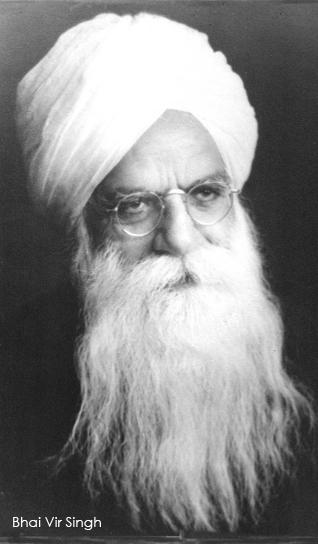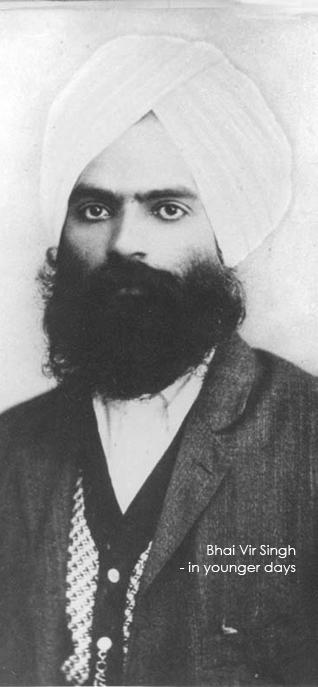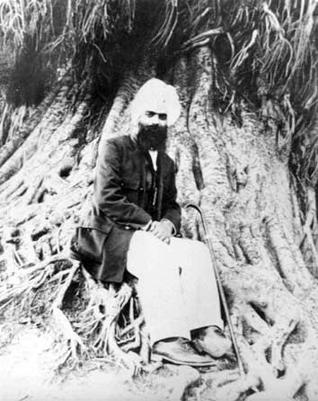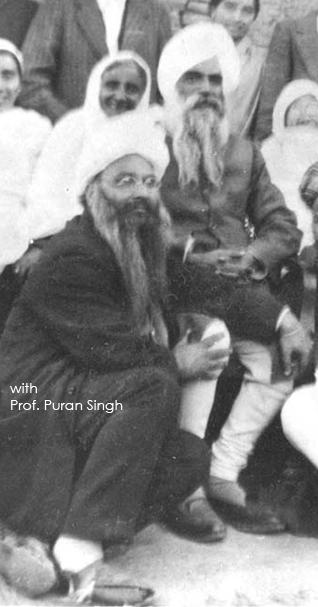Our Heroes
Bhai Vir Singh: The Sixth River of Punjab
by Dr. BALBIR SINGH
Bhai Vir Singh (December 5, 1872 - June 10, 1957) is known as a ‘Maker of Punjabi Literature' and hence ‘The Sixth River of Punjab‘. He was a poet, novelist, editor, exegete, historian and a journalist. He was the leading figure in the Singh Sabha, the dynamic Sikh renaissance movement in early 20th century Punjab.
The following is the talk given in 1960 by Dr. Balbir Singh (Bhai Vir Singh's younger brother) on the 3rd death anniversary of his brother. It is being reproduced here to commemorate his 137th birth anniversary celebrations, which are scheduled for December 5, 2009.
[PLEASE NOTE: Bhai Sahib's birthday celebrations are scheduled for Saturday, December 5, 2009 at New Delhi, Dehradun and Mumbai. Details of each programme are listed hereunder, following the text of the lecture.]
 
Today, we commemorate the death anniversary of one who never believed in death.
He believed in life eternal, in the immortality of man and he conveyed this message of hope through prose, poetry, music, history, philosophy, drama, conversation and commentaries.
He not only gave these contributions but also influenced many writers that have written in Punjabi. This fact has been noticed far and wide.
The other day I read an article that appeared a while back in the Times Herald in Virginia, U.S.A. and lately has been reproduced in some local papers in India. The editor there, taking notice of Bhai Sahib and his works, remarks, "It can easily be understood how this man has influenced every writer, poet and scholar of his age. He has a delicate and flower-like touch, yet beneath the greatness is a consciousness of immortality that does not fail to communicate itself to the reader."
Now about those writers that have influenced others, there is a remark by a critic named ‘Lander.' Talking about Shakespeare he said, "A rib of Shakespeare would have made one Milton, the same portion of Milton made all the poets born ever since."
In as much as Punjabi literature is concerned, and the Punjabi poets and writers are concerned, these remarks can aptly fit Bhai Sahib.
He was born somewhere about 1872 and lived for about 84 years. His literary career lasted a good 66 years. During that period, he wrote and edited something like twelve hundred tracts (booklets) of the Khalsa Press Society, fifty books and left a good deal of unpublished work to be published as posthumous volumes. Out of which I have personally published so far six volumes during these last five years.
His books that made a mark were:
Rana Surat Singh 1905
Raja Lakhdata Singh 1910
Lehran de Haar
Baba Naudh Singh 1907-1921
Neeti Shashtra 1916
Matak Hulare
Bijilian de Haar 1927
Qualgi Dhar Chamatkar 1925
Suraj Prakash 1926-1933
Satwant Kaur 1928
Guru Nanak Chamatkar
Preet Veena 1957 (the year he passed away).
[Also, Sundari, Bijay Singh, and a string of other poetry and essay anthologies]
To understand Bhai Sahib, I give you a quotation from the Yajur Ved: ‘O god, give me wealth, give me cows, give me land, children, wives, property all these things.' But one rishi who was a great poet and saint, turned it into his own prayer - "O god, in me let there be music, poetry, fame, knowledge."
The exact words are:
swarsh chamey - give me music
sloksh chamey - give me poetry
shavarsh chamey - give me fame, glory so that people may appreciate my worth and honor me
sharuthish chamey - give me knowledge
Now, that was a great improvement on people asking, "Give me wealth, give me cows and give me children."
But Bhai Sahib made a further departure in his own version of the prayer.
He pleads: "O God, Give me swar, (music) and give me slok (poetry), but take away fame and take away knowledge!"
That is the spirit of Bhai Sahib and that spirit pervades all his works.
He wrote a beautiful poem on violets. The gist is, if I may put it in English: "I am like a violet who remains concealed in his foliage. I wish to remain concealed and die unlamented. Alas! It is my perfume that betrays my existence."
The lines in Punjabi are very famous and they are now sung in every home. They begin this way:
Meri chhipei rahey gulzar, Main neevaan ungiyaa
Koyee lage na nazar tapaar, Main parbat lukiyaa
Main liyaa arsho rang jo shonkh na vann da
Haan, dhuro garibi mang, main aayaa jagat te.
Then he goes on, the last lines being -
Meri bhinni eh khusboye kiven te chhipdee
Meri chhipei rehan di chaah te chhip tur jaan dee:
Haan, puri hundi naah, main tarley le rehaan.
He says: my art, my conversations are like a perfume. I cannot conceal it. I have concealed my color. I have concealed my structure. But this fragrance, this perfume is all pervasive. It travels far and wide and brings in recognition. This recognition interferes with my work of self-realization and self-expression. The idea that I want to remain concealed is not a matter of mood. It is not an expression of constraint. It is a shunning of society and fame.
This was a constitutional part of Bhai Sahib's self.
The Punjab University, though belatedly, recognized the merit of his work. They adopted a resolution to confer upon him the Doctor's degree. I think it was D.O.L. (Doctor of Literature). It was perhaps to be conferred in the first convocation when Trivedi and Patel and some others were invited for that purpose.
Bhai Sahib would not go. He said, "I don't want it." Of course, he was very polite in saying so but he would not accept it. The result was that the University Syndicate passed a resolution to send the Registrar to his home with the degrees and honors and all that.
Sardar Bhopal Singh, the Registrar of East Punjab University, came to our house with that diploma or whatever you call it and that big gown that you wear - the red one - it is still lying in our house as a piece of decoration.
Sardar Bhopal Singh made a short speech and concluded his remarks by saying: "Please permit us to add that in honouring you, it is not so much an honour to your person as a recognition of the fact that in honouring men such as you, the Punjab University is honouring men and women of letters who deserve as much honour as statesmen, politicians and others of the world."
That was his Doctor's degree. I was not there. This ceremony took place in Amritsar. I was at Dehra-Dun. Bhai Sahib immediately wrote to me a small poem of four lines beginning with -
Dada piyoo san ved doctor
Shafaa jinhaa de chumdee pair
Our father was a medical man, Dr. Charan Singh. Our grandfather, ‘Dada ji', was a famous hakeem (traditional doctor) of olden times. Bhai Sahib wrote they have made me a doctor. But I am not a doctor. My father was a doctor; my grandfather was a hakeem. And they were so good that they had the art of healing. Wherever they would go, they would heal and cure: Paani garo vidiyaan sande man budh vasey jinhaa de kher, Assee anari rahe umar bhar ... However, I never learnt this medicine or practiced the art of healing. I remained anaari ... Na pandit na bane hakim, Doctor da je hudam chalaa aan lagaa ta lagsee gair - I feel so odd that at this age I have to carry this appendix of Doctor.
His satire was - Doctor da je hudam chalaa aan lagaa ta lagsee gair ... This is to illustrate the man was cultivating only swar (music) and slok (poetry) while shunning shruv (fame) that was showered upon him. I say to you that he threw overboard these goods and the heavy load of learning.
He was quite learned and was a great Persian and Sanskrit scholar. He knew grammar very well but he never thought that these things would help in the emancipation of his soul; or in giving that taste of freedom or bringing about the union of the individual soul with the cosmic soul to which he was aspiring.
About knowledge - his remarks were, that, whatever our learning is, ultimately it is - Sir kachkaul banna hath leetha ... ‘kachkaul' is a beggar's bowl, the bhikshapatra, that I made my head the beggar's bowl.
After giving up this side of knowledge and refusing to chase fame, he was cultivating only two things in his life: music and poetry.
Music to him was not a mere piece of recitation on a musical instrument or a piece of melody sung by a person.
No! Music to him was a living personality, which gains an independent existence, independent of the singer or the musical instrument. That was his personal experience about music.
Once I was asked by the editor of the ‘Everyman's Library' to give a sample of Bhai Vir Singh's poetry in English. For his benefit, I translated this piece of poetry that was published in the Empire edition of poetry in London. The translation:
There arose a melody
From the throat tuned and fine
A shake
Of folded thrills near me
It moved
Like a cloud of grey
On the point to shine
Through its touch
It made me shiver
I quivered
As one endowed with wine
For a moment
I swam in fragrant air
Tossed to and fro
To the edge of space and time
Then left melting
With the song in void
Like a flake of snow
On the ocean's chime
These two things, poetry and music, become warp and woof of his life and wove a very good pattern on the whole. And that pattern is his dreamland - the land of his visions, which becomes real for him, in which he lives; which he portrays, which he interprets and to which he directs the attention of other people so that they may get their guidance from that.
About dreams, an author has remarked that dream abides, it is the only thing that abides. And then, another famous poet writes: "Yet after break and still or stone are gone and flesh and blood are dust, the dream lives on."
Now Bhai Sahib's poem:
Supne vich tussi mile asannu, asaa dha galvakri payee
Niraa nor tussi hath na aaye saadi kambdi rahee kalayee
Dha Charna te sees nivayaa sadey mathe choh na payee
Tussi ocche assi nivey sa sadee pesh na gaeeya kayee.
Phir larh farney noo uth daurhe par larh O bijlee-lehraa,
Ood-da janda par oh apni choh saanu gayaa layee;
Mitti chamak payee eh moyee te tussi looyaa vich lishkey
Bijlee koond gayee tharaandi, hun chakachundh hai chayee
I met You in dreamland
I rushed and embraced You.
All brilliant,
All bright,
My hands
Failed to grasp such light.
I was left
With my trembling, vain wrists.
Passionate desire once failed,
I try again
Race to pay obeisance,
My head bent
At the feet of the Divine.
But even a wisp
Eludes my forehead.
You stood so high
I, so very low,
My appeal,
My attempts
All
Go unfulfilled.
And
Then I try again.
I get up,
Run to grasp
Just
One end of Your robe.
But woe,
Lightening rippled through it.
It flew
Fluttered past
And rewarded me
With the slightest, softest touch......
[Translation from Punjabi by Sanmeet Kaur]
This is one of his best pieces in which both music and poetry are woven together.
I was saying earlier that he wove the reality of dreams with music. What I want to convey by this is that his idea was that it is the experience of dreams that give content to the living moments.
It is different from a similar idea found in English literature. A well-known poet writes about giving appointments to others to meet him in dreams.
There is a poem by that heading -
"Meet me in dreamland,
And make my dreams come true."
The idea that dreams are true only in dreamland, though Man wants the dreams to be extended. But for Bhai Sahib, it is the experience of dreams that gives content to the living moments of life.
After having experienced something in his dreams, he says: "Kamdi rahee kalayee" in relation to the spiritual experience of life. It arises out of that vision which he wove through the cultivation of his intense poetry and music.
Today, we celebrate the death anniversary of Bhai Sahib Bhai Vir Singh. As I said in the beginning, he never believed in death. He is still here although we can't see him. He wrote a poem before his death describing the same thing.
Kithe ho?
Kole ho
Koonde nahin?
Koonde ho par kanni sad sunendi nahin
Kithe ho?
Kole ho,
Disde nahin?
Disde ho par soorat nen vasendi nahin.
Kithe ho?
Kole ho,
Milde nahin?
Milde ho par tan noo deh lapetdi nahin.
Kithe ho, mere shone sayee.
Kole ho, mere pyaare saayee.
Hao kole par taraf Milan di sambediyaa sambeldi nahin.
Where are You?
You are beside me
Why can't I hear You then?
I do hear you yet my ears are deaf to Your call.
Where are You?
You are beside me
Why can't I see you then?
I so see you but my eyes cannot grasp your form.
Where are you?
You are beside me
Why can't I meet you then?
We do meet yet I cannot wrap Your body around mine.
Where are you, my Beautiful Beloved?
You are beside me, my Loving Lord.
Yes, You are, yet I pine for our reunion,
As I contain my passion, it drowns me.
[Translated from Punjabi by Sanmeet Kaur]
December 5 Birthday Celebrations - DETAILS:
NEW DELHI
Venue: Bhai Vir Singh Sahitya Sadan, Bhai Vir Singh Marg, Gol Market, New Delhi - 110001
Programme:
Saturday, Dec 5
8:00 - 9:30 am
Kirtan: Asa Di Var, Bhog - Sehaj Paatth & Naam Simran
By students of Guru Granth Sahib Vidya Kendra
9:30 - 10:15 am
Kirtan: Bhai Ajit Singh & Bhai Kulbir Singh
10:15 - 10:25 am
Recitation of Bhai Sahib's poem
By Sardarni Taranjit Kaur
10:25 - 10:40 am
Sandesh: Sardarni Simal Joginder Singh
10:40 - 11:30 am
Kirtan: Bhai Baljeet Singh Namdhari
11:30 - 11:45 am
Release of Sadan's publications & Homage:
Maharani Preneet Kaur
12:00 Noon
Ardas and Samapti, followed by Guru Ka Langar
Inaugration of exhibition of rare handwritten Birs and Hukamnamas on the first floor by India's First Lady, Sardarni Gursharan Kaur
RSVP: Delhi 23363510 http://www.bvsssindia.com/
 
DEHRADUN
Venue: Dr. Balbir Singh Sahitya Kendra, 20 Pritam Road, Dehradun. India.
Programme:
Saturday, Dec 5
9.30 - 11 am
Sehaj Paatth Bhog and Kirtan by Bhai Kanwarpal Singh
11.30 am
Dr. Balbir Singh Memorial Lecture by Prof. Prithipal Kapoor, Pro-Vice Chancellor (Retd.), Guru Nanak Dev University, Amritsar, Punjab
Topic - Contribution of Bhai Sahib Bhai Vir Singh and Dr. Balbir Singh to Society.
Followed by Lunch
 
MUMBAI
Venue: Flat number 13, Rakhi Mahal (formerly ‘Usha Kiran‘), Opposite CCI Club, Churchgate, Mumbai - 400 020. [Ph # (+91 22) 2282 0728. [This is the apartment where Bhai Sahib would stay during his annual Bombay visits. Bhai Sahib's bed and leather chair in which he would usually sit, are among the items available for view.]
Programme:
Saturday, Dec 5
5.30 pm:
Kirtan
8.00 pm
Langar
[Courtesy: Panchbati Sandesh, A Quarterly Journal of The Dr. Balbir Singh Sahitya Kendra, Dehradun.]
December 3, 2009
Conversation about this article
1: I.J. Singh (New York, U.S.A.), December 03, 2009, 12:11 PM.
A wonderful tribute to a fantastically talented man, totally dedicated to Sikh values and practices. His work continues to inform and inspire many even today more than 50 years after his death. He was also the first novelist who wrote in Punjabi. Another gem from his pen speaks of the evening of one's life when the shadows have lengthened, yet the wellsprings of desires continue unabated (Sanjh hoyee parchhave(n) chhip gaaye itchha bal too jaree) and then continues to remember those who know and live the pangs of passion (Seenay khich jinaa ne khaadi au kar araam nahee behnday). The sixth river of Punjab he was. But a generation that does not know him has replaced his poetry with alcohol as the sixth river. A wonderful mystic. But we all have blind spots and he was no exception; the legend of Hemkunt owes much to his patronage.
2: Preet Kaur (Mumbai, India), December 03, 2009, 4:36 PM.
Bhai Vir Singh's tracts and novels permeated the Sikh consciousness for several generations in the first six or seven decades of the twentieth century and brought out the best in the community. It is imperative that we have all his works translated in proper English so that they are available to the younger generations. This must-do task is long overdue.
3: Raj (Canada), December 03, 2009, 10:41 PM.
Bhai Sahib was a saint as defined in The Guru Granth. Apart from the books he wrote, there're excellent books that are written by others about him. "Piaray Jeo" is my favourite, because it gives understanding of him through his contemporaries. When his friends wanted his opinion or advice, he would write them a letter and address them as "Piaray Jeo". Hence, the name of this book compiled by Vishwanath Tiwari.
4: Gurinder Singh Johal (Amritsar, Punjab), December 04, 2009, 11:07 AM.
It is interesting to read this article. Bhai Sahib was a saint-poet and a lover of nature. His fantastic poems on the beauty of Kashmir are still as fresh as flowers - among them: Iccha bal te dungiaan Chhaanwaan, Veri Naag, Chinaar da budda rukh, Gulmarg, etc. In Amritsar, on Lawrence Road, there is the house of Bhai Sahib. It is the biggest house in the loacality, with a peaceful and serene environment. When one enters the house, it seems as if we have entered a religious place. Now this house has been converted into a museum in his memory. A large variety of trees and flowers are to be found on the property. Every day, flowers from the garden are taken inside to adorn the rooms - a practice started by Bhai Sahib himself which is still going on. Each tree has a plate beside it identifying the species. This house was desighned by Bhai sahib himself. Upon entering the house, one can see the dining table, sofa-set, and the room where he use to write; his homeopatyy medicine vials,spectacles, rosary; Babaji's room; and a lot of other things are still there. Going there is like going on pilgrimage. One can spend time in peace there. Unfortunately, few Amritsaries now visit the house. Majority of the people here do not know about it, or that it is open to the public. Unfortunately, no Punjabi newspapers publish stories about him anymore, even on his birth and death anniversaries. sikhchic.com has done good in publishing this piece because, after Bhai Gurdas ji, he is the most revered scholar in our community.
5: P. Singh (Vancouver, British Columbia, Canada), December 05, 2009, 4:52 AM.
I feel richer for having read this wonderful article. It's a shame so many of us who were born and raised in the West are unfamiliar with the beautiful work Bhai Vir Singh has left for us. This article certainly motivates me to brush up on my Punjabi and start reading!
6: G S Tucker (USA), March 12, 2013, 11:21 PM.
Can somebody please convey details of celebrations connected with Bhai Vir Singh ji in New York and Toronto? I would like to make it a point to attend.
7: Ranjeeta Kaur (New Delhi, India), November 29, 2013, 1:49 AM.
I am very much impressed by Bhai Vir ji's writings. I have subscribed his page on facebook. Could you please tell me where I can find his precious literature, books? [EDITOR: Google the name and it'll lead you to various booksellers. If not, try "Singh Brothers", Amritsar. They're online as well.]
8: Akashdeep Singh (Karachi, Pakistan), January 14, 2014, 12:37 PM.
I don't have the words to praise Bhai Sahib. I have been reading 'Kalgidhar Chamatkar' and I realize what Sikhism actually is about, and who was Guru Gobind Singh ji. Bhai Sahib has drawn a realistic picture of Guru Sahib through his writing. No saakhi I can get through without having my eyes wet ...
9: Harjashan Singh (Italy), February 02, 2015, 6:02 PM.
He was a great man and a true Sikh. Thanks, Bhai Sahib ji for your contribution to Sikhi.






